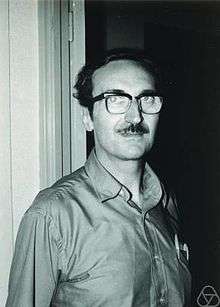Eugenio Calabi
| Eugenio Calabi | |
|---|---|
 Eugenio Calabi | |
| Born |
11 May 1923 Milan, Italy |
| Nationality | United States |
| Institutions |
University of Pennsylvania University of Minnesota |
| Alma mater |
MIT Princeton University |
| Doctoral advisor | Salomon Bochner |
| Known for | Calabi conjecture, work on differential geometry |
| Notable awards |
Leroy P. Steele Prize (1991) Putnam Fellow (1946) |
Eugenio Calabi (born 11 May 1923 in Milan, Italy[1]) is an Italian-born American mathematician and professor emeritus at the University of Pennsylvania, specializing in differential geometry, partial differential equations and their applications.
Calabi was a Putnam Fellow as an undergraduate at MIT in 1946. In 1950 he received his Ph.D. from Princeton University, where his advisor was Salomon Bochner.[2] He later obtained a professorship at the University of Minnesota.
In 1964, Calabi joined the mathematics faculty at the University of Pennsylvania. Following the retirement of the German-born American mathematician Hans Rademacher, he was appointed to the Thomas A. Scott Professorship of Mathematics at the University of Pennsylvania in 1967. He won the Steele Prize from the American Mathematical Society in 1991 for his work in differential geometry. In 1994, Calabi assumed emeritus status. In 2012 he became a fellow of the American Mathematical Society.[3]
His work on the Calabi conjecture for Kähler metrics led to the development of Calabi–Yau manifolds.
See also
References
- ↑ American Men and Women of Science, Thomson Gale 2004
- ↑ Eugenio Calabi at the Mathematics Genealogy Project
- ↑ List of Fellows of the American Mathematical Society, retrieved 2012-11-10.